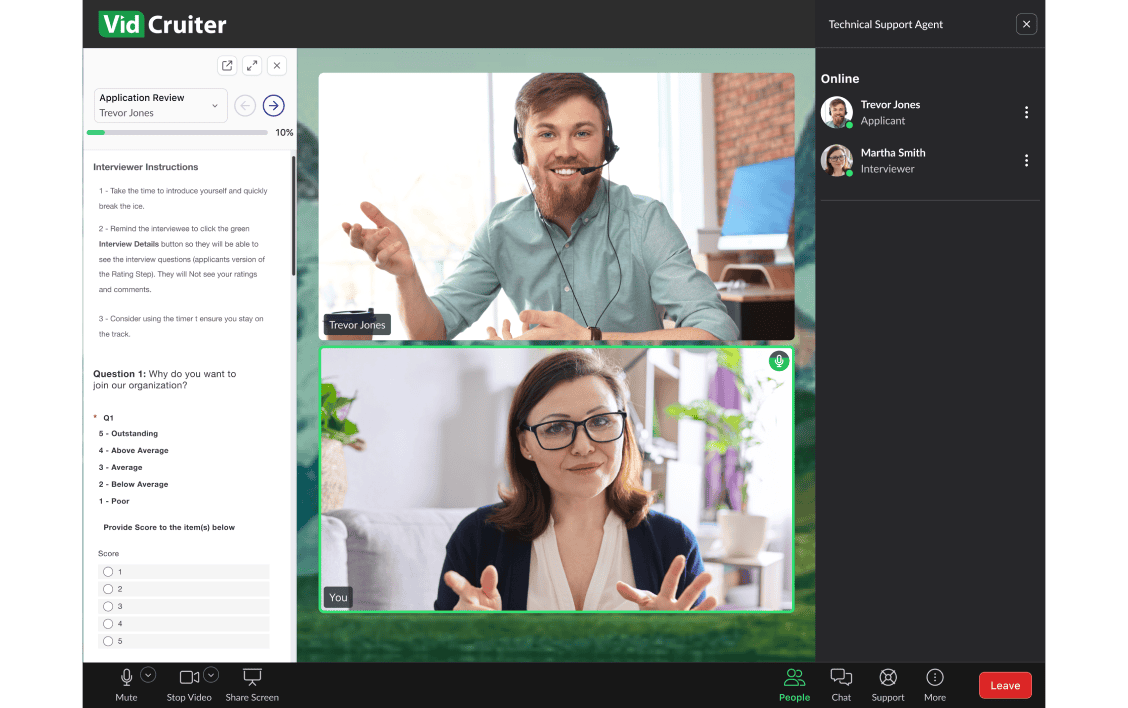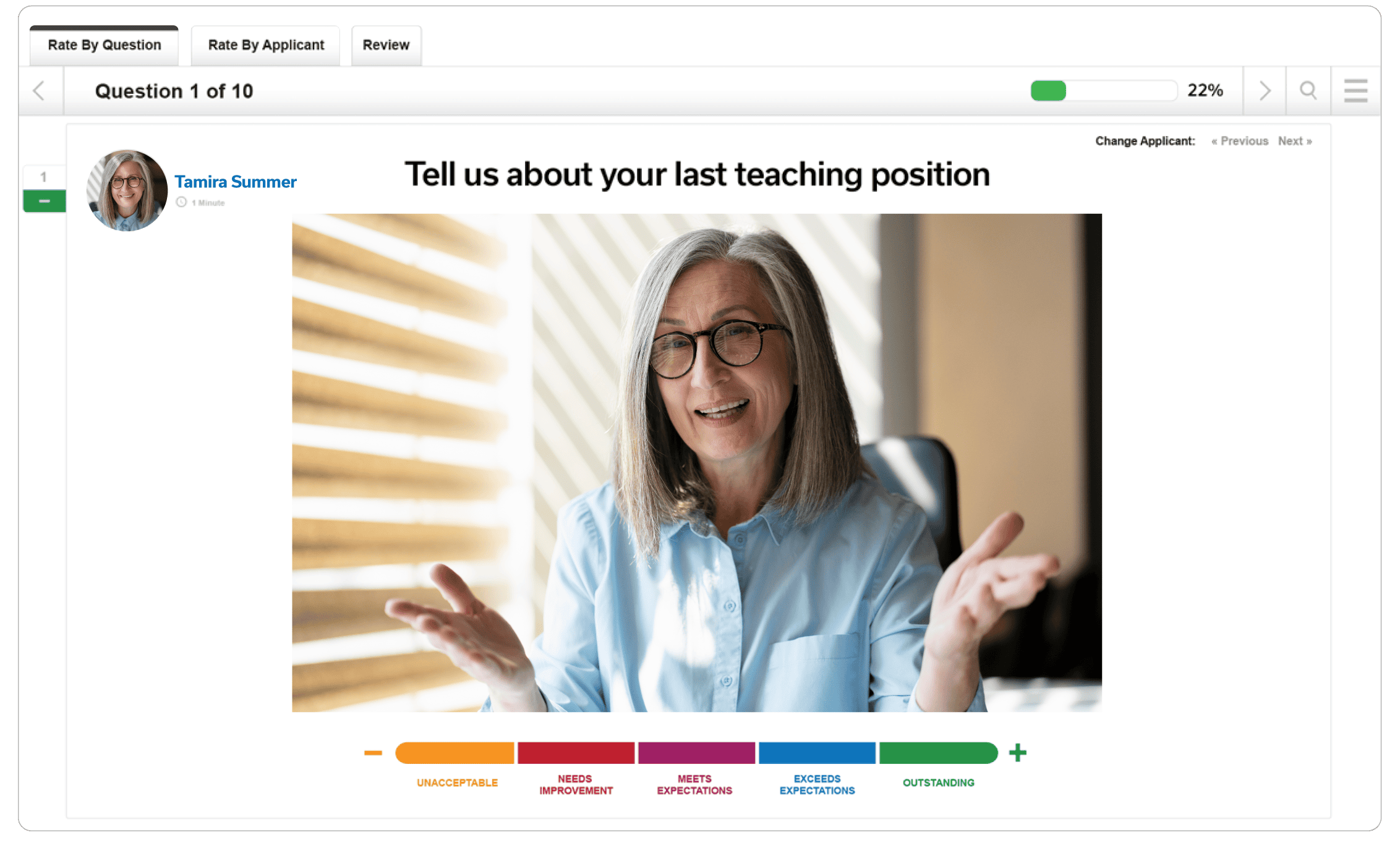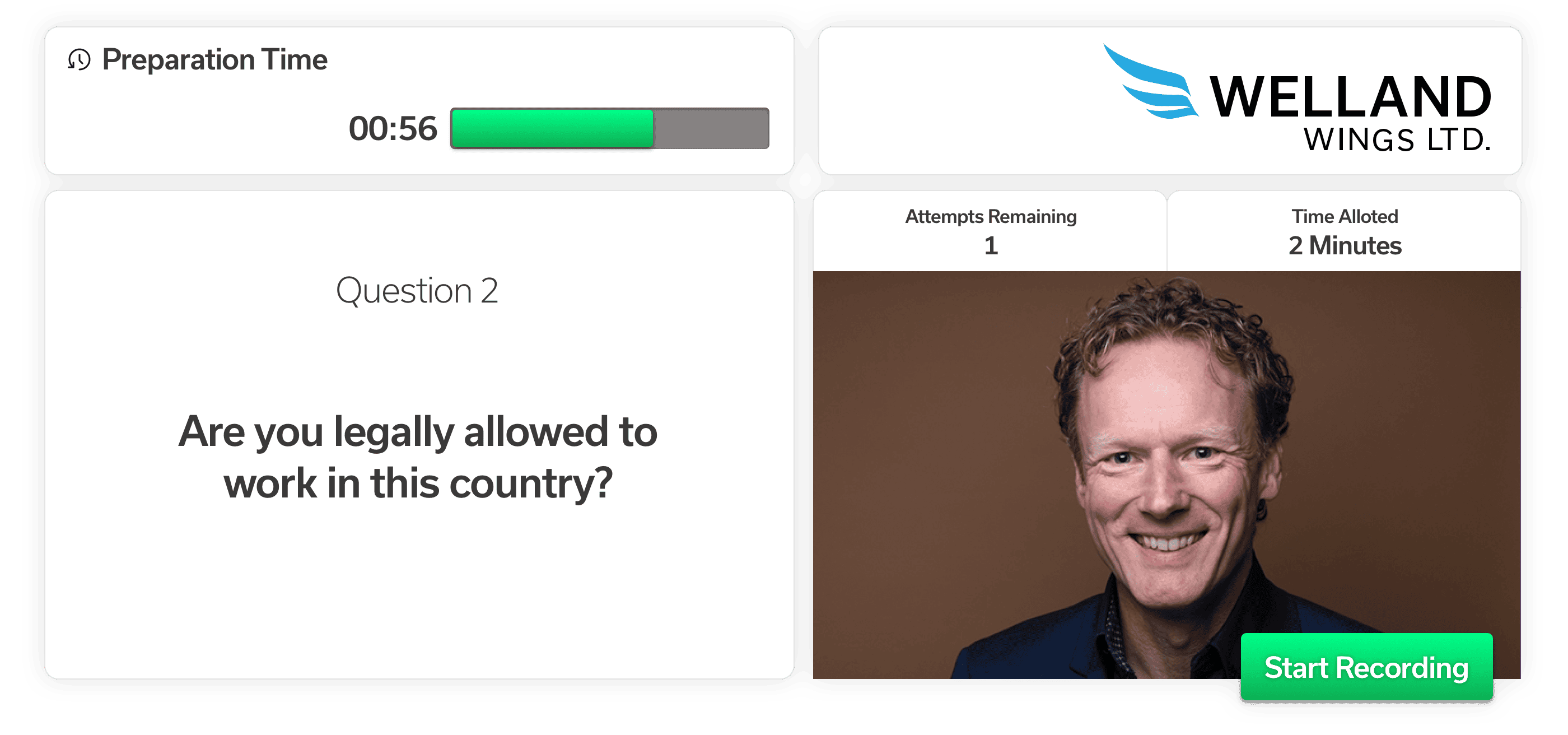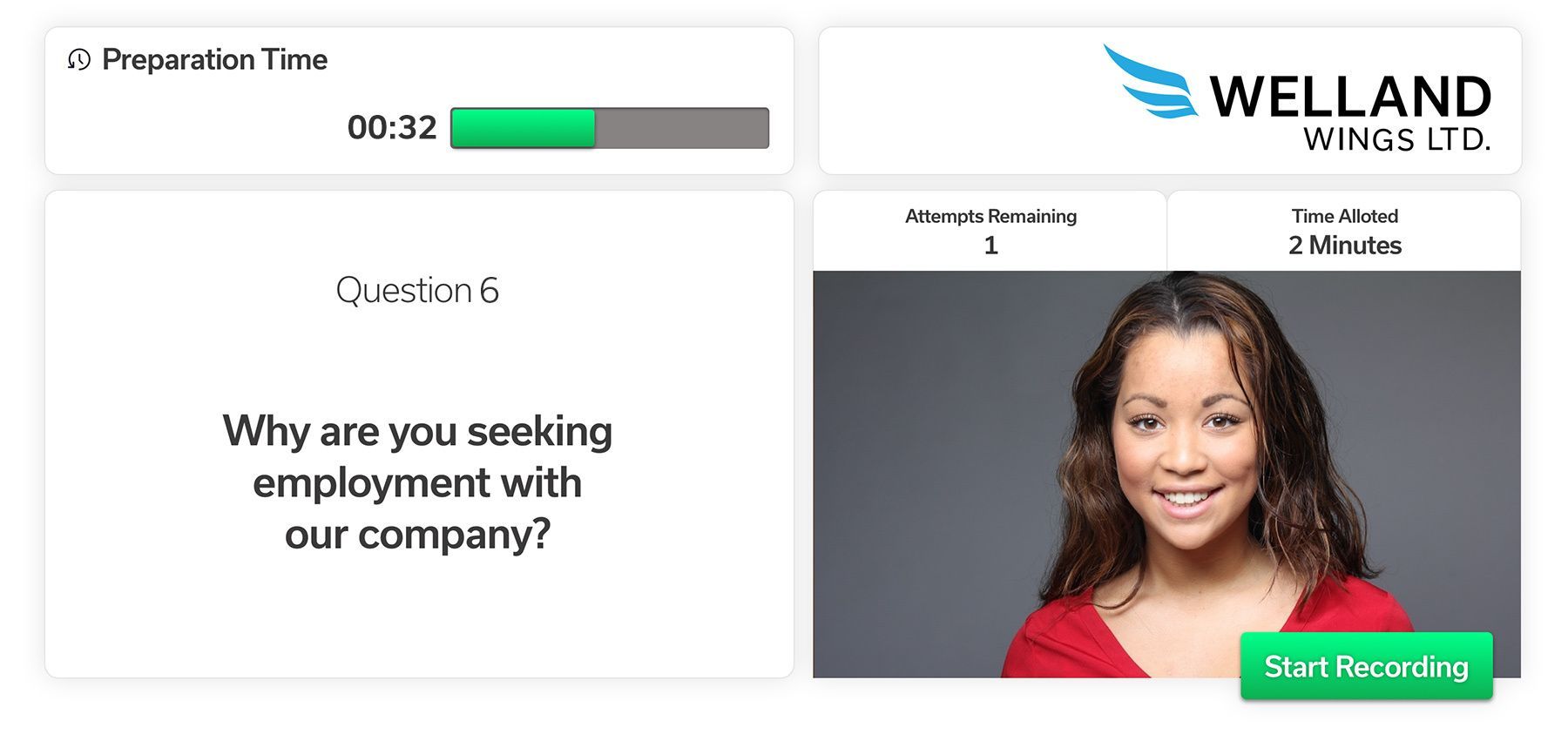
Must-Ask Interview Questions for Every Job
Uncover the best interview questions to ask and learn how they can help you identify the perfect candidate for any role.

Every day we connect job seekers with potential employers. Our hope is that this connection helps you land work you love and excel in.
To help you prepare, we examined dozens of popular interview questions, asked hiring experts for advice on the best ways to answer them.
First, let’s answer some FAQs about video interviewing.
It depends! Regardless of the format, the fundamentals of interviewing remain the same. You’ll want to project confidence, professionalism, and enthusiasm for the job whether you’re being interviewed digitally or you’re in the same room as the interviewer.
That said, there are two kinds of video interviews, and the way questions are asked can vary during each.
Real-time virtual meetings similar to Zoom, Skype, or FaceTime

2.) Pre-Recorded Video Interviews
Also known as one-way or on-demand interviews

Live Video Interviews
Live video interviews are similar to in-person interviews because the questions are asked in real-time, face-to-face (albeit virtually).
Pre-Recorded Video Interview
During one-way (pre-recorded) video interviews, the questions are asynchronous to your answers, meaning they’re not occurring at the same time. Instead, you respond to pre-set questions whenever it’s convenient, and your answers are sent to the hiring team so they can review them later.
You should prepare for either kind of interview the same way, but just know that the one-way interview format allows for video. They may include situational questions, which ask you to demonstrate how you’d handle on-the-job situations.
For example, you might be shown a video of an angry customer and asked to roleplay how you’d resolve their complaint. Imagine you already have the job, and answer from that point of view.
Close-ended questions can typically be answered with ‘yes’ or ‘no’. They’re usually asked as part of the initial screening in what are known as knockout questions.
Example: Are you legally allowed to work in this country?

Open-ended questions are much more common during job interviews. They’re your chance to provide a more detailed, well-rounded explanation to the interviewer’s question.
Example: Why are you seeking employment with our company?

Now, let’s get to the heart of the matter. What are the most popular interview questions, and how do you answer them?
Why Interviewers Ask This Question:
While this is technically a statement, it can also be asked in question form: “How would you describe yourself?” and the sentiment is the same. This is typically one of the first questions asked during an interview because it’s so broad and open-ended; it acts as a good icebreaker.
It allows interviewers to better understand how candidates view themselves and what they prioritize. What applicants choose to reveal tells potential employers more about their backgrounds, personality, and values.
How to Answer This Interview Question:
Aim for a mix of 80% professional and 20% personal information in your response. After all, this is a job interview, so your focus should be on what you can bring to the role and the company as a whole.
Mention your skills, work experience, education, and any extracurricular or volunteer activities, especially those that are related to the line of work for which you’re applying. You may also mention professional memberships, as well as participation on boards or committees.
Since much of this information may already appear on your resume, consider this a highlight reel conversation. Briefly summarize the main professional points you want to emphasize, and then add some color by sharing one or two personal facts (like a hobby, or where you live).
For example, a candidate for a Marketing Manager position could say: "I have over seven years of experience in digital marketing, strategy development, and brand management. I have a strong background in leading cross-functional teams to execute campaigns. In my last role, I managed a team of five and we grew our customer base by 30% within the first year."
“It sets the tone for the rest of the interview. It's an ambiguous question so if someone does not prepare for it, they may start getting off track and just start talking about themselves too much on a personal level.
You want to make sure your answer is tailored to the role, how you are relevant to it and will add value. Basically how you are uniquely qualified for the role.”

Jen Narayan,
founder of CareerRealTalk.com
Why Interviewers Ask This Question:
Hiring managers are looking to hire someone who genuinely wants the position—not someone who just wants to collect a paycheck. This question helps interviewers gauge applicants’ interest in the role and understand what motivated them to apply. It’s also another way of asking why an applicant left a previous employer or is considering leaving their current employer.
How to Answer This Interview Question:
Whatever you do, do not badmouth any of your employers or coworkers in your response. Even if you are pursuing a new job because you are unhappy at work, steer clear of the temptation to rant or gossip. Instead, explain what caught your eye in the job posting.
You might mention how you could see yourself fitting into the corporate culture, or list positive things you’ve heard about working there (either from a friend or from online company review sites).
For example, a candidate looking to score a Software Engineer position could answer: "I’ve always admired how your company combines cutting-edge technology with a strong emphasis on social impact. This aligns with my passion for building products that solve problems. I’ve worked with similar tech stacks in my current role, and would be absolutely honored to work on innovative projects like the ones your company has with talented professionals in the space."
“In this question, the candidate should briefly state what they like about their current job, that they enjoyed their time there and then pivot to explain why this job posting interested them.
The candidate should incorporate knowledge of the company, industry, as well as what job responsibilities piqued their interest and how it aligns with their career growth in their answer.”

Max Chan
founder of ChanWithAPlan.comWhy Interviewers Ask This Question:
The reasoning behind this question is two-fold. On one hand, it helps interviewers determine what you consider to be your greatest assets. But, it also helps them feel out your confidence level in your abilities—and whether or not you try to claim undue credit.
How to Answer This Interview Question:
You want to come across as capable and confident, but not arrogant. Don’t over-exaggerate your skillset or boast about a successful project that was really more of a team effort.
Instead, give an example of something no one seems to be able to do quite like you can at work. List a transferable skill (like intimate knowledge of a useful software) and a soft skill, which can be just as valuable. About 36% of employers look for multitasking skills; 31% look for initiative; and 21% look for creative thinking.
For example, a candidate who’d like to become the next Customer Support Representative for a company could say: "My biggest strengths are patience, communication, and empathy. I’m really good at staying calm under pressure, which helps me manage difficult customer interactions effectively. I can listen to their concerns, ask the right questions to diagnose issues, and communicate solutions clearly."
Why Interviewers Ask This Question:
Hiring teams want to know if you’ve done your homework before meeting with them. Candidates who haven’t spent time researching the company and can’t speak to what it does come across as unprepared or even uninterested in the job.
How to Answer This Interview Question:
You don’t need to memorize a bunch of stats or rhyme off absolutely every detail about the company. But, well in advance of your interview, visit the potential employer’s website (especially the About Us page), as well as their social media accounts. 47% of interviewers said that they wouldn’t offer a job to a candidate if they had little knowledge of their company.
Learn as much as you can and relay your findings related to:
For example, a potential future Financial Analyst could answer: "From my research, I understand that your company is a leader in the financial services industry, with a strong focus on providing data-driven investment solutions to institutional clients. You have a reputation for innovation in asset management. Your commitment to both financial performance and social responsibility really resonates with me. I admire how your team integrates ESG (Environmental, Social, and Governance) factors into your investment strategy."
If some of these things are still fuzzy, this is a great time to ask clarifying questions. Doing so helps you determine if it’s a good fit for you, too!

Why Interviewers Ask This Question:
Although five years is a common timeframe, this question may be positioned more generally such as “How do you see your future?” or “How would you like to shape your career path?”. Regardless of how the question is phrased, the intention behind it is to determine how future-thinking you are, and whether or not you plan ahead.
How to Answer This Interview Question:
Give this question some serious thought before your interview. Close your eyes and imagine that you’re working your dream job surrounded by a great team of people. You’re living your best life and accomplishing your goals, whatever those may be for you.
For example, a current Human Resources Manager could say: "In five years, I envision myself in a more senior HR leadership role, possibly as Director of HR or Chief People Officer. I’d like to focus on driving organizational development and refining company culture at a larger scale. I’m passionate about aligning recruitment strategies with business goals, so I hope to shape HR policy and workforce planning on a global level."
Consider all the steps it’d take for you to get there, and use this honest reflection to help shape your answer. Of course, keep your response focused mostly on your professional aspirations.
Why Interviewers Ask This Question:
Interviewers are inviting candidates to put themselves in their shoes, and answer the biggest question of all: “Why should we hire you?”
At this stage, you’ve likely already touched on some of the things you can bring to the role, but a direct question calls for an all-encompassing elevator pitch. They’re trying to see if you can “sell” yourself. Show off a little!
How to Answer This Interview Question:
Consider what makes you different from other applicants and how you stand out from the rest of the pack. How has your education and work experience combined to give you what it takes to succeed in the position?
You may want to mention what you did well in similar roles, articulating how that helped the company. You could also talk about what you’ve learned from past employment to propel your career in this direction.
For example, a Product Manager candidate could answer: "I’m confident I can manage the entire product lifecycle, from ideation to launch. I’ve successfully led teams through market research, product development, and post-launch analysis to ensure products meet both user needs and business goals. Also, I recently drove a product redesign that decreased churn by 17% during Q3. My ability to prioritize customer needs while maintaining strong business relationships with cross-functional teams helps me take any project from good to great."
Now that you know the most common interview questions and you’re prepared to answer them, don’t forget the basics.
Some lesser known best practices can be found in our Ultimate Guide to Acing Your Video Interview. We encourage you to read through them to perfect your digital interviewing skills and answer any popular interview questions hiring managers may ask you during the recruitment process.
Good luck!
Common questions include: “Tell me about yourself,” “Why do you want this job?” and, “What are your strengths and weaknesses?” Prepare for these in advance.
Research the company, review the job description, and practice your responses. Practice talking about your experience, skills, and specific examples of how you achieved success. Tailor your answers to the role and company.
Provide a brief summary of your professional background, and emphasize your most relevant experience and skills. Focus on what sets you apart from other candidates and highlight any achievements that align with the role.
Modernize your hiring process with expert insights and advice.